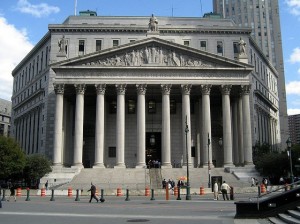
Going to court
Every debtor, regardless of the chapter of bankruptcy they file, must make one personal appearance in the case. That appearance is at the first meeting of creditors.
It isn’t really in “court” since the judge is not present; it’s a meeting with the trustee and any creditors who choose to come.
It’s probably not even in a courtroom, but in a meeting room somewhere. Or these days, by Zoom.
In most consumer cases, no creditors come at all.
The first meeting of creditors
The court schedules a meeting of creditors in each case, usually about 30 days after the filing. The meeting is nick-named the “341 meeting” after the section of the bankruptcy code that requires it.
The trustee assigned to the case presides and asks questions of the debtor about the contents of the bankruptcy schedules.
In cases where there are assets with value greater than the available exemptions, the trustee tries to gather information to aid in his liquidation of those assets for payment to creditors.
He may ask for the business records or other documents concerning the assets or the debtor’s financial history.
Not a test or an inquisition
Neither the trustee nor the creditors can take any action at the meeting that decides any question central to the case. It is a fact finding meeting.
Of course, if new or troubling facts come out at the meeting, the trustee or a creditor can file a motion or an adversary proceeding in the bankruptcy court for the judge’s consideration.
Most 341 meetings are short, sweet, and uneventful. The debtor does not have to justify filing bankruptcy. No rights are won or lost at the 341 meeting.
Creditors do not have to attend the 341 meeting to file a claim or object to discharge.
What happens at the meeting?
The trustee examines your proof of identity and social security number, first. Forget those essential items, and you’ll probably have to come back.
The trustee swears you in and begins his questioning. I have some tips for answering the trustee’s questions. The meeting is either tape recorded or recorded by a court reporter.
Standard questions asked by the trustee at the 341 meeting include:
- Did you read the schedules before signing?
- Did you list all of your assets?
- Did you list all of your debts?
- Are the schedules accurate?
- Do you want to make any corrections to the schedules?
- Have you lived in this state for the past two years?
- Do you owe anyone domestic support?
- Are your cars insured?
- Have you destroyed your credit cards?
The trustee may also ask how you reached the values on your assets and for more information about unusual assets or business interests.
If the trustee needs more information or documents that aren’t available at the meeting, the meeting may be continued until another date when the information can be provided and any questions answered.
Will my creditors be there?
Creditors are invited to the meeting, though most creditors don’t come.
Creditors who do attend are usually those with security interests in the debtor’s assets or creditors who think that they have been defrauded.
Creditors are permitted to ask the debtor questions under oath. The scheduling constraints of most trustee’s calendars usually limit each creditor to a few minutes at the 341 meeting.
Creditors can ask the court for an order requiring the debtor to appear for a further examination, like a deposition, under the provisions of Bankruptcy Rule 2004.
It’s the last meeting, too
Most 341 meetings are concluded after the debtor’s first appearance.
Unless the client is reaffirming a debt or moving to avoid a lien, the first meeting of creditors is usually the last time I see my Chapter 7 clients.
More
Keeping your car after bankruptcy
Image courtesy of Wally Gobetz and Flickr
